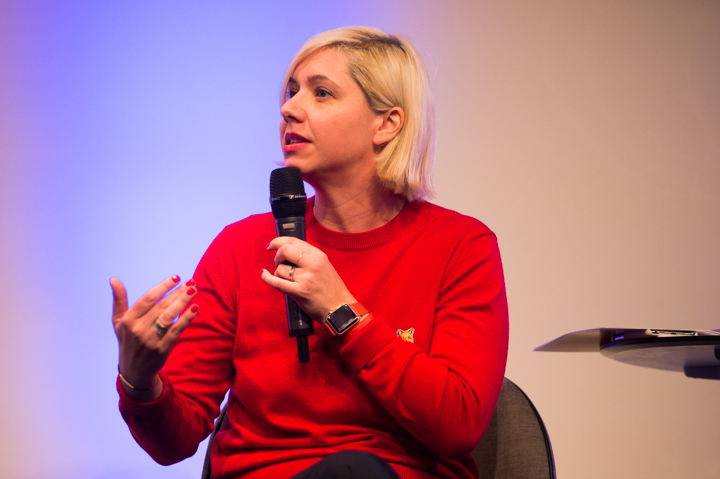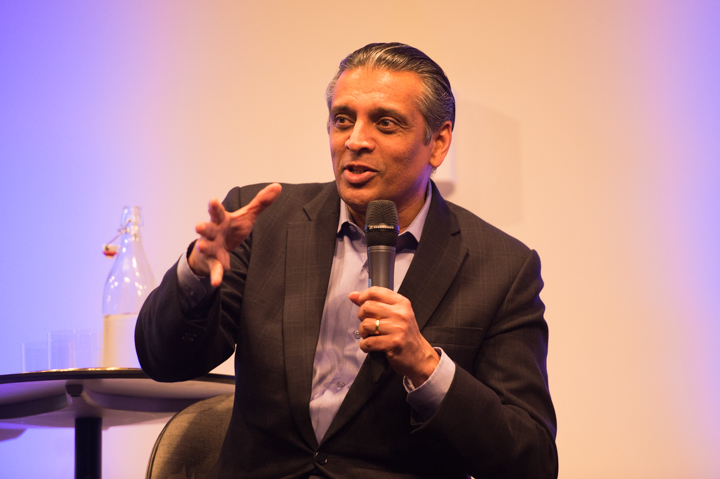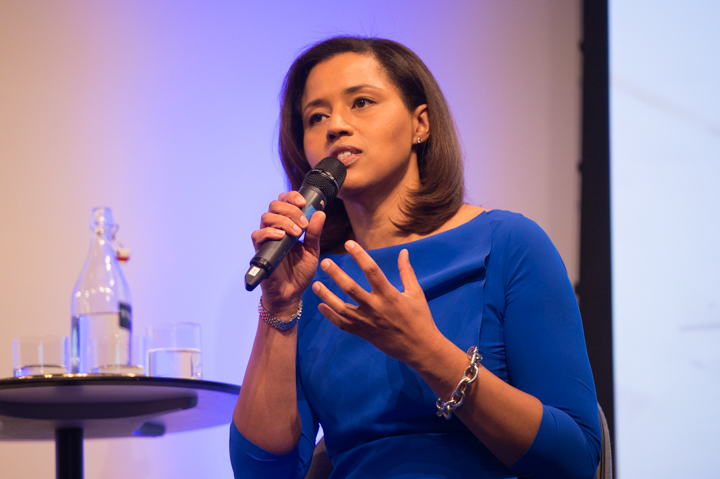The importance of organizational culture has grown dramatically over the years. Initially seen as a “soft” topic that paled in comparison to the weightier concerns such as strategy and structure, leaders now view culture as a crucial element in managing a company. But how much focus should leaders put on culture, and what is a CMO’s role in shaping an organization’s culture? Appearing before an audience of senior marketers at Spencer Stuart’s 16th Annual CMO Summit, three global leaders — Nina Barton, president of global growth with The Kraft Heinz Company; Marie Gulin-Merle, CMO of Calvin Klein; and Rajesh Subramaniam, chief marketing and communications officer of FedEx — discussed culture and the lessons they’ve learned as it has become an increasingly large part of the brand experience.
How organizational culture began
Spencer Stuart consultants began the evening by pointing out that it used to be that leaders could successfully run a business by focusing on strategy and structure. However, as the pace and complexity of business has increased, culture has become critical to running an effective organization. No longer is it good enough to set a strategy and a structure. Culture as a business discipline is not just a nice to-have, but critical to the sustained success of any organization.
Technology changed everything
Digital advancement has not only dramatically changed the way businesses run, but it’s also dramatically transformed culture. Gulin-Merle noted that, incredibly, speed simply wasn’t very important a few short years back. “When I started in ecommerce, we were saying, ‘Oh, why do we need two-day shipping?’” she recalls with a laugh. “Then it became, ‘Maybe we need to move to one-day shipping,’ and now we’re talking about same-day shipping and one-hour shipping.”

Marie Gulin-Merle of Calvin Klein
As a result, organizations had to adapt and become “always on,” Gulin-Merle said. To facilitate that, she said digital fluency has become an increasingly large part of operations, and marketing leaders must incorporate it throughout their operations. “Marketers need to know technology — it’s not just the responsibility of the IT department anymore,” she said. “I think digital IT will become a marketing function at some point.”
Marketers also need to be nimble to adapt to the fast pace of digital, and that agility must become a key part of the company’s culture, Barton said.
“To react to the new demand and environment, you need to ingrain innovation and speed into your culture — it simply has to be part of it. And that’s the biggest shift I’ve seen,” Barton said. “The DNA of the organization has to take on the value and the culture of things like speed and innovation — not just within certain departments like marketing, but across every department, whether it’s finance or strategy or sales.”
When Barton was asked, “How do you infuse that type of speed into these big iconic brands?” (referring to Kraft Heinz’s brands such as Philadelphia and Gevalia), she replied that innovative thinking has become a company-wide effort, and even functions as disparate as finance and sales are working together to find solutions to digital issues. “If you take that effort to innovate and ingrain that into your culture, and make it one of your core values, you can really start to shift things in a very positive direction,” she said.
Culture is “the pointed end of the spear”
In a B2C business, the culture manifests itself in the way customers are treated, Subramaniam said. For all of the seminars and discussions and efforts made to change and improve a culture, he said, it all comes down to that moment when the customer is standing at the counter.

Rajesh Subramaniam of FedEx
“Ultimately, in the service business, the brand is the sum total of customer experiences that you deliver around the world,” he said. “At that point, culture becomes paramount. It’s the pointed end of the spear. We talk about customer experience in theory all the time, in books and articles, and so on. But in reality, it’s people interacting with people. There’s a magic that happens at the moment of interaction, and that’s really where culture comes in.”
Culture needs to be consistent
The group repeatedly emphasized that culture needs to be consistent with what the consumer experiences. The younger generation can sense inauthenticity, and the increased importance of brand and brand reputation mean transparency and consistency are paramount.
“Culture is the core of everything you do, so it’s like the nervous system,” Gulin-Merle said. “So the consumer side of marketing cannot be different from the culture side of the company, because customers can smell if there are two worlds. It’s part of the CMO’s role to ensure they’re consistent.”
To create this consistency, it’s essential that marketing leaders are seen acting in a way that’s attuned to the culture they want to create, Barton said. “The most important thing we can do, every single day, is to live the culture we want it to be,” she said. “If I don’t do that, if I’m not innovative, if I don’t act like an owner, if I don’t believe in the culture we’ve grown and developed, we lose credibility as an organization. Then it becomes an HR exercise, as opposed to it being part of the DNA.”
Culture must be managed
More companies want to create a culture that supports and aligns with strategy, and getting there doesn’t happen by accident. Rather, leaders must develop a thoughtful plan for evolving the culture, ideally creating a culture that’s authentic and plays to the organization’s strengths.
“There’s something to be said for intentionally managing a culture,” Subramaniam said, recalling how a leadership team discussion about the FedEx culture changed his mind about the importance of managing culture. “I have to say, I walked into the room thinking, ‘Ehh, this is HR stuff. It’s soft.’ But at some point, there was a question about, ‘What does FedEx mean to each of you?’ And they went around the room, and it was an extraordinarily powerful conversation. People really connected with their hearts. There were some tears. I couldn’t believe it. And the question turned to, ‘If a group like that got together in 20 years, would they have the same reaction?’ And the answer was, ‘Not unless we manage this intentionally.’”
Millennials are making culture their own
The evening wound down with a look at millennials and the way they influence culture. Subramaniam noted millennials are becoming the primary share of their workforce, and said they have a broader set of considerations they bring to the marketplace and their jobs. “I sit down with a lot of recruits, and I hear the word ‘culture’ come up quite a bit,” he said. “When I got recruited, I don’t think I could spell ‘culture.’ But it’s a whole different ballgame now — they’re asking, ‘What are you about?’ ‘How do you work together?’ ‘What does the company stand for?’ The people who have culture figured out have an edge here, because those questions are top-of-mind for millennials.”

Nina Barton of The Kraft Heinz Company
Barton added that millennials connect closely with values and purpose, and are very rigorous about authenticity in their purchasing and employment decisions. “The desire to have a cultural fit, in terms of values, is more amplified for millennials than it was for other generations,” she said. “If they don’t feel a fit, they won’t just slog through it. They will probably be very vocal about it. And if you can harness that properly, they can be a champion and driver for continuing to amplify the culture.” Gulin-Merle agreed, noting she uses the reactions of millennials as a litmus test for authenticity. “For me, it was a blessing to have this wave of millennials coming into the workplace,” she said, “because they are the test for the culture. They ask, ‘Is it relevant?’ ‘Is it current?’ ‘Does it work?’ Because if it doesn’t work for them, it doesn’t work.”
Conclusion
As the event closed, it was clear that culture is now on the leadership agenda. In that vein, Spencer Stuart moderators ended the event with a challenge, saying it’s up to the people in the room to take on the effort and help shape culture at their companies. How can a marketing leader be more of a creator of culture? How can you be part of shaping this future as a marketer in partnership with your CEO, creating the kind of broader organization and culture that will enable both the financial success but also the vitality and sustainability of your business?